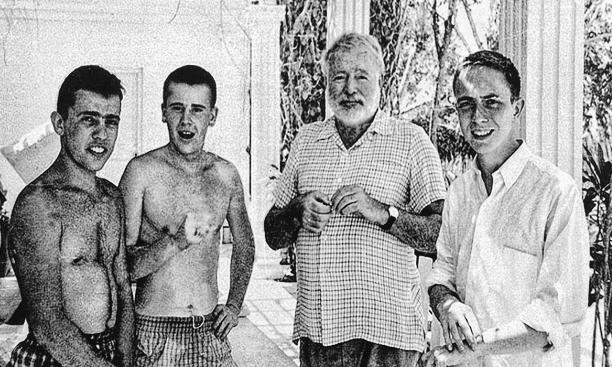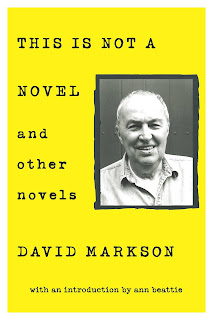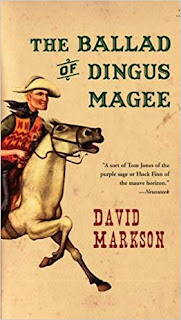The
word serendipity
was
born in
1754 when
Horace
Walpole made
it up for a
fairytale he
was writing.
Today,
the New Oxford American Dictionary defines
serendipity
as
“the occurrence and development of events by chance in a happy or
beneficial way.” This I learned happily
reading
David Markson’s The
Last Novel.
I had not
known of Markson or his work until several weeks ago perusing a
blogpost’s comment thread. I don’t recall whose blog, or whose
rave endorsements of Markson prompted me to look him up on
Amazon.com, where I downloaded the Kindle version of This
is Not a Novel, and Other Novels,
which is actually one long list of quotations, odd facts, and
personal observations, broken into three parts, with the third part
titled The
Last Novel.
I
learned also that fish feel no pain, and that Thomas Hardy’s first
wife, Emma, kept a twenty-year diary devoted to assassinating his
character, and that upon her death he burned the infuriating
thing.
I learned so so so much more
in The Last Novel, which I almost abandoned after the first
few pages, for which I am chagrined and embarrassed to the extent I
feel an overwhelming pressure to confess—right here right now, in
this very space. Some might find it mitigating that I had no idea
what I was getting into when I downloaded This is Not a Novel, and
Other Novels, thinking it
possibly a sort of post-post modern crime novel because the blogpost
discussion launching
the
adventure, which caused me to buy also a David Goodis crime novel,
had mentioned that David Foster Wallace was a Markson admirer. (I
have resolutely refused even to consider reading anything by David
Foster Wallace on grounds he was a darling of the incestuous
New York literati, yet his endorsement of Markson did attach a
certain twisted cachet in the same vein as Einstein’s having kept a
few Perry Mason paperbacks hidden in his Princeton University
office.)
I
suppose it is possible the Wallace connection, in
addition to fancying something
different, prompted me to open Markson’s book before Goodis’s. I
started with Ann Beattie’s fawning introduction. They were friends,
she discloses, and her lengthy literary tribute is “over the moon,”
to borrow her phrase. But she pulled me in with this line:
“Try to stop reading
one of these three novels. Meanings accrue;
mysteries arise;
you laugh when you least expect to laugh.”
I took it as the challenge it
was meant to be, read a couple of pages of each novel, resisting all
the way because they weren’t what I’d expected, and clicked the
book back into the library. I even opened the Goodis novel,
Nightfall, knowing it would be good, but I delayed starting
it, bothered by my disappointment with the Markson. Finally opened
Markson again and re-read Ann Beattie’s intro. Then I skipped to
The Last Novel and
started reading again, and before I could again say “What the hell
is this thing?” found myself over the moon and on my way to Mars.
Beattie was right. I could not stop.
Novel: Wondering when
and where the last casual streetcorner conversation in Latin might
have taken place.
[I laughed.]
Novel: Dante will
always remain popular because nobody ever reads him. Said Voltaire.
[Ditto]
Novel:
It
Ain’t Necessarily So.
In Danish. Which was piped into Danish radio by the underground
whenever announcements were made of German victories in World War II.
[Catching
the drift?]
Novel:
Pietro Aretino died in the midst of a hysterical fit of laughter that
apparently turned into an apoplectic stroke. As had the Athenian
comic playwright Philemon — at ninety-nine. Or one hundred and one.
[Not only did I have trouble
taking a break from reading The Last Novel, I’m having
trouble restraining myself from copying all of its lines to this
report!]
Okay,
one more: Yasser Arafat was reported not to have
read one book in the last forty years of his life. But to have spent
innumerable hours enrapt by Tom and Jerry cartoons.
Somewhere along my rush
through Markson’s astonishing collection of anecdotes, quotes,
observations and personal opinions, the serendipitous element I
mentioned above was taking shape just beneath the surface of my
consciousness: Tangney.
 |
| Tangney (second from left) |
William E. Tangney,
interviewer
of Hemingway, discoverer of Einstein’s Perry Mason
books, founding editor of the York Town Crier (later changed to its
more corporate-comfortable name Yorktown
Crier), assembler of anecdotes, quotes, odd facts, and
personal observations. Missing friend. I lost touch with Tangney
nearly two decades ago after he left Virginia for Naples, Florida. He
refuses to communicate online, rarely answers his phone, and never
answers letters. Yet, a welcoming and genial host. I visited him
regularly when he lived in a book-crammed Yorktown house owned by
Mary Mathews, the Greek restaurateur he’d persuaded to pony up the
cash to birth a weekly newspaper that’s now owned by a regional
chain. Bill is a spellbinding storyteller, a constant reader and
compulsive taker of notes. His grand strategy was eventually to
publish his assemblage of quotes and quips and curious minutia in a
book. I don’t know if this has come to pass. Two days ago I got his
address from WhitePages.com and had Amazon.com send him a copy of
This is Not a Novel, and Other Novels. It should arrive today.
Bill may be piqued by such cheek, but he’ll have some laughs.
Novel: Anthony Trollope
was once told by an acquaintance that one of his recurring serialized
characters had become boring. Trollope killed her off in the next
installment.
[Hahahahaha]
Novel: If it were up to
me, I would have wiped my behind with his last decree. Said Mozart —
after a demand by the Archbishop of Salzburg for more brevity in his
church compositions.
Baldur von Schirach, one of
the chief Nazi war criminals tried at Nuremberg, on the origin of his
anti-Semitism: From a book about the Jews by Henry Ford.
If on a winter’s night with
no other source of warmth, Novelist were to burn an Andy Warhol,
qualms? Qualmless.
Pushkin’s beautiful
seventeen-year-old wife Nathalie, whom he married at thirty-one —
and whom he said was the one hundred and thirteenth woman he had been
in love with.
1922.
Ulysses.
1922. The
Waste Land.
1922. Reader’s Digest.
There are four chances in
2,598,960 of being dealt a royal flush in a hand of poker.
How old would you be if you
didn’t know how old you was? -- Satchel Paige.
Please return this book. I
find that though many of my friends are poor mathematicians, they are
nearly all good bookkeepers. -- Walter Scott’s bookplate.
No battleship has yet been
sunk by bombs. Said the caption on a photograph of the USS Arizona in
the program for the 1941 Army-Navy football game — eight days
before Pearl Harbor.
Never having realized that
there originally once was an actual troublemaking Irish family named
Hooligan.
Or a military officer named
Shrapnel.
The John Cage composition
entitled 4’33”, in which the performer sits at a piano for four
minutes and thirty-three seconds — and plays nothing.
Wondering if there can be any
other ranking twentieth-century American poet whose body of work
contains even half the percentage of pure drivel as Wallace Stevens’.
A sort of gutless Kipling,
Orwell called Auden.
I’m going. I find the
company very uncongenital. Says someone in a Gypsy Rose Lee mystery.
The French government provides
the Paris Opera a subsidy of roughly $ 135,000,000 each year. The
United States gives the Metropolitan Opera less than $ 1,000,000.
[potato chips for the curious,
good-humored mind]
Abject bottom-licking
narcissism — Martha Gellhorn found in Hemingway.
Morningless sleep, Epicurus
called death.
One would like to curse them
so that thunder and lightning strike them, hell-fire burn them, the
plague, syphilis, epilepsy, scurvy, leprosy, carbuncles, and all
diseases attack them. Ignorant asses. -- Martin Luther, in a
contemplative mood re the papal hierarchy.
A writer of something
occasionally like English — and a man of something occasionally
like genius, Swinburne called Whitman. A man standing up to his neck
in a cesspool — and adding to its contents, Carlyle called
Swinburne.
It is utterly impossible to
persuade an editor that he is nobody. Said William Hazlitt.
Comedy aims at representing
men as worse, tragedy as better, than in actual life. Says Aristotle.
Berlioz read every Fenimore
Cooper novel as quickly as it appeared. And admitted that fully four
hours after he finished The Prairie he was still weeping over the
death of Natty Bumppo.
A dreadful old fraud, Edmund
Wilson called Robert Frost. A sententious, holding-forth old bore who
expected every hero-worshipping adenoidal little twerp of a
student-poet to hang on his every word, James Dickey would elaborate
subsequently.
The eighteenth-century
evangelist George Whitefield. Whose pulpit voice was so effective,
said David Garrick, that he could make listeners laugh or cry by no
more than pronouncing the word Mesopotamia.
Dear President George W. Bush:
Herewith please find uncorrected proofs for the newly discovered
rewritten version of Heidegger’s Sein und Zeit. Kindly limit
your review to twelve thousand words. Thank you.
Remembering that Charles
Darwin is buried in Westminster Abbey.
For no reason whatsoever,
Novelist has just flung his cat out one of his
four-flights-up front windows.
[several pages later:
Novelist does not own a cat,
and thus most certainly could not have thrown one out a window.
Nonetheless he would lay odds that more than one hopscotching
reviewer will be reading carelessly enough here to never notice these
two sentences and announce that he did so.
I
am no Einstein, once said Einstein.
Listen,
I bought your latest book. But I quit after about six pages. That’s
all there is, those little things?
[And
I still have the first two lists of “those little things” to
read!]


No comments:
Post a Comment